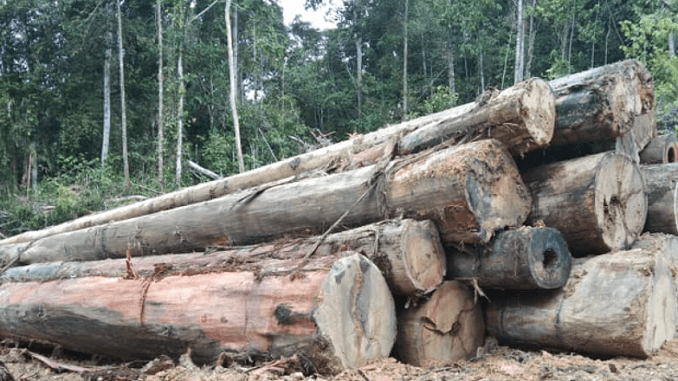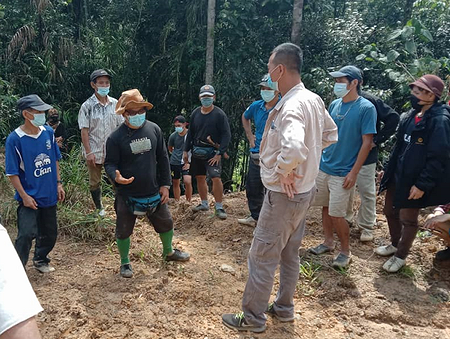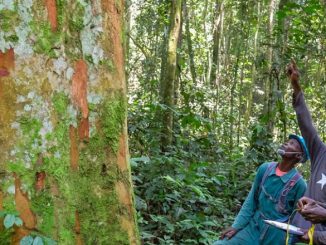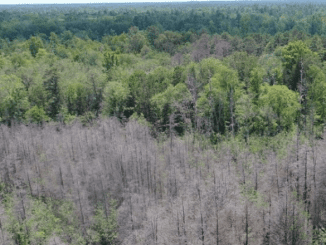
LONG AJENG, Sarawak, Malaysia, September 16, 2021 (ENS) – In Malaysian Borneo, a dozen indigenous Penan communities of Sarawak’s Upper Baram region have acted in concert to stop the bulldozers of Samling, a Malaysian logging giant that is encroaching into some of the last primeval forest on the world’s third-largest island.
Community sources explain that the blockade was erected on September 9 across a logging road deep in Sarawak’s interior near Batu Siman, one of the state’s mountain ranges in the middle of a planned protected area.
Pictures from the scene show 40 Penan on a Samling bulldozer that has been brought to a halt and decorated with posters saying “Warning to Logging Companies – This forest is a Penan traditional territory. Do not encroach on our land and our rights.”
Posters carried by Penan community representatives say “Stop the Chop” and “Mai Teveng Kayeu Me,” Don’t cut our trees.”
In a joint letter to Sarawak Chief Minister Abang Johari, 12 community leaders are requesting urgent government action to stop Samling from destroying the last old-growth forests in the Upper Baram region, an area that has been designated for protection.
The timber company wants to cut all the trees it can before the area is protected. Last year, the International Tropical Timber Organization, ITTO, approved a Malaysian government project, informally named the Baram Peace Park, which aims to protect and sustainably develop the region with enhanced community participation.
“We call on the Sarawak state government to safeguard Sarawak’s last remaining primary forests and respect the communities’ clear will to keep these forests intact,” said Lukas Straumann, director of the Bruno Manser Fonds, a Swiss NGO created to honor Bruno Manser. This Swiss environmental activist lived with the Penan tribe in Sarawak from 1984 to 1990, organizing blockades against timber companies.
The Bruno Manser Fonds is based in Basel, Switzerland, a city that is contributing financially to the Baram Peace Park. In July, Basel announced a contribution of US$200,000 to the ITTO’s proposed Baram Peace Park.
Basel Mayor Beat Jans said the city government decided to support this project in order to sustain the livelihoods of indigenous communities in the area and to honor the lifetime achievement of Bruno Manser, the Basel-born environmentalist who went missing in Sarawak in May 2000.
“We welcome the city of Basel’s support for this project. It is a milestone and will animate other donors to join in and make this exceptional community-driven conservation project come true,” said Straumann, executive director of the Bruno Manser Fonds, which is contributing another US$200,000 to the ITTO project.
The Upper Baram Forest Area was submitted by the Malaysian government to ITTO and approved in November 2020. The total budget of the project is US$2 million. Malaysia is covering US$1.2 million leaving the remaining US$800,000 to be funded internationally.
The ITTO project covers an area of 283,500 hectares in the upstream region of the Baram river system and will benefit 24 indigenous communities – Penan, Kenyah, Kelabit and Saban – living in the area.
It consists of a core zone of 79,000 hectares of primary forest, a buffer zone of secondary forest and an agricultural zone which has been traditionally used by the communities for paddy cultivation. The project proposal was drafted in close cooperation with community representatives who have fought for the conservation of their forests and the sustainable development of their communities for 30 years.
The Long Ajeng blockade is the latest development in an ongoing stand-off between indigenous communities and Samling, a Malaysian timber giant with its headquarters in Miri, Sarawak.
Since the end of last year, communities in other Samling concessions in the region have repeatedly complained about a lack of due consultation by Samling over the PEFC certification of timber logged in their community forests.
PEFC, the Programme for the Endorsement of Forest Certification, is a global alliance of national forest certification systems that aims to ensure sustainable forest management and harvesting.
It differs from the standard-setting Forest Stewardship Council, FSC, which certifies that a forest is being managed in a way that preserves biological diversity and benefits the lives of local people and workers, while ensuring it sustains economic viability.

Samling is denying all allegations of wrongdoing in the forest. Instead of engaging in an open policy dialogue on their operations, Samling is suing Save Rivers, a Sarawak civil society organization, for defamation.
On August 30, more than 100 organizations sent a letter to Samling asking the timber giant to withdraw its legal suit against Save Rivers and its board members.
The organizations asked Samling to provide them and its Gerenai and Ravenscourt concessions in Sarawak’s Baram and Limbang region with all of the environmental and social impact assessments conducted for certification by the PEFC-endorsed Malaysian Timber Certification Scheme.
The Samling suit claims Save Rivers made defamatory statements about the company in several press releases throughout 2020 and 2021, questioning the sustainability of Samling’s logging operations in Sarawak and the certification process by the Malaysian Timber Certification Council.
The signatories from Malaysia and around the world believe this is a SLAPP lawsuit – strategic litigation against public participation (SLAPP), and is part of a growing international trend of silencing human rights and environmental defenders.
The suit against Save Rivers was filed after Indigenous communities had lodged official complaints against Samling with the Malaysian Timber Certification Council, MTCC. Save Rivers reported on this process and on the community resistance to Samling’s logging concessions.
Although Save Rivers was not the entity to file the complaints, the MTCC is no longer moving forward with a dispute resolution process due to the lawsuit filed by Samling.
“If they are truly committed to sustainability and obtaining free, prior, and informed consent, Samling should work with communities and allow the dispute resolution process to proceed rather than strong-arm local resistance into silence,” said Jettie Word, Executive Director of the Borneo Project.
“This unprecedented move begs the question, did Samling file the suit in order to disrupt the dispute resolution process and avoid accountability?” asked Straumann. “We request Samling to stop legal action and engage in meaningful dialogue. As a first step, all necessary documents required for Free Prior Informed Consent need to be released, such as the full environmental and social impact assessments, including the High Conservation Value Assessment for their logging concessions.”
Featured image: Logs harvested by Samling from the Upper Baram region in Sarawak, Malaysia on the island of Borneo. September 2021 (Photo courtesy Penan community and Bruno Manser Fonds)
© 2021, Environment News Service. All rights reserved. Content may be quoted only with proper attribution and a direct link to the original article. Full reproduction is prohibited.



